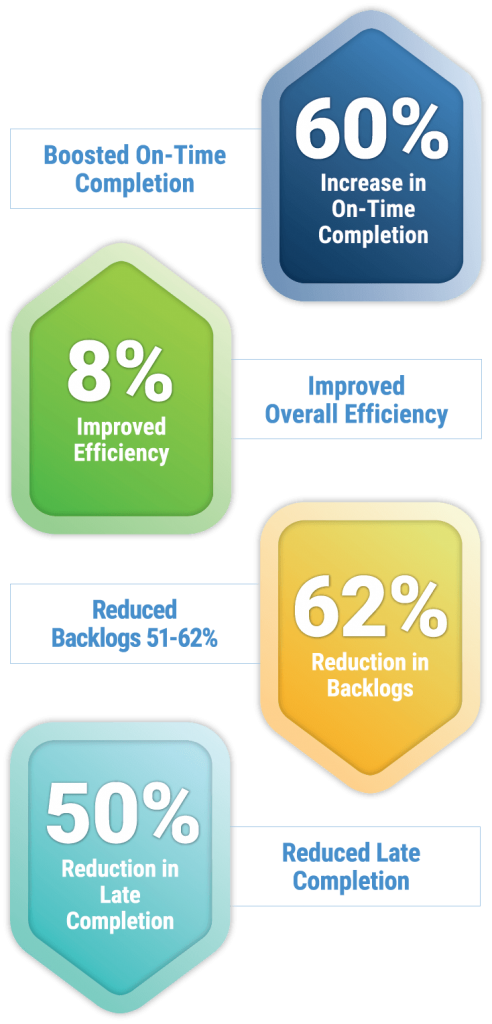
This large provider of group insurance sought to reduce its contracts case backlog, embody its customer service philosophy, and create a greater capacity for future growth. The POWERS team opened channels of communication and equipped frontline managers with the tools to improve accountability and productivity. The results? A 60% jump in on-time completion, an 8% gain in efficiency, improved service, and newfound capacity to accommodate three years of growth.

Project Overview

Performance Results
Background
Our client is the contracts organization within a national provider of group insurance. This group is responsible for ensuring that contracts are written properly to address the specific provisions for each new client. The insurer expected new accounts to be operational within 30 days of being sold. However, this process was taking much longer, with many of the delays attributed to the contracts group.
In addition, the insurer had just introduced new customer service standards. The department needed help translating the aspirational philosophy into operational metrics and strategies. POWERS was engaged to help the insurer reduce turnaround times, provide consistent quality when processing cases, and accommodate future growth.
Situation Analysis
The new customer philosophy promised, “We will work with a sense of urgency and integrity, and complete requests in a timely manner.” Unfortunately, this was nearly impossible in the absence of clear expectations or management controls. A “blame game” mentality across the departments undermined timely performance.
Employees often waited until the day before their deadline to open cases, only to discover problems or information missing from counterparts, creating missed deadlines.
Workers might identify a problem on Day 1 and email the person directly in front of them but never follow up. There was also no defined process with timeframes for escalating problems to a manager. Lack of regular interaction among the key departments that touched each case caused cases to bounce back and forth due to missing or incorrect data.
There was no ability to track the status of cases or issues because there were no management controls over the process flow. What’s more, the management environment was reactive instead of proactive. Managers only dealt with problems brought to them, rather than trying to anticipate and prevent problems in the first place.
Finally, the leadership team needed to plan for the future, but did not know how to predict how many people they would truly require. They knew their existing capacity model was incorrect but couldn’t assess their real capabilities to generate the right numbers for planning.

New Frontline Leadership Management Skills and Controls Turn Service Ideals into Timely Service Improvements for Large Group Insurance Provider
This large provider of group insurance sought to reduce its contracts case backlog, embody its customer service philosophy, and create a greater capacity for future growth. The POWERS team opened channels of communication and equipped frontline managers with the tools to improve accountability and productivity. The results? A 60% jump in on-time completion, an 8% gain in efficiency, improved service, and newfound capacity to accommodate three years of growth.
Our client is the contracts organization within a national provider of group insurance. This group is responsible for ensuring that contracts are written properly to address the specific provisions for each new client. The insurer expected new accounts to be operational within 30 days of being sold. However, this process was taking much longer, with many of the delays attributed to the contracts group.
In addition, the insurer had just introduced new customer service standards. The department needed help translating the aspirational philosophy into operational metrics and strategies. POWERS was engaged to help the insurer reduce turnaround times, provide consistent quality when processing cases, and accommodate future growth.
A Need for Urgency and Accountability
The new customer philosophy promised, "We will work with a sense of urgency and integrity, and complete requests in a timely manner.” Unfortunately, this was nearly impossible in the absence of clear expectations or management controls. A "blame game" mentality across the departments undermined timely performance.
Employees often waited until the day before their deadline to open cases, only to discover problems or information missing from counterparts, creating missed deadlines.
Workers might identify a problem on Day 1 and email the person directly in front of them but never follow up. There was also no defined process with timeframes for escalating problems to a manager. Lack of regular interaction among the key departments that touched each case caused cases to bounce back and forth due to missing or incorrect data.
There was no ability to track the status of cases or issues because there were no management controls over the process flow. What's more, the management environment was reactive instead of proactive. Managers only dealt with problems brought to them, rather than trying to anticipate and prevent problems in the first place.
Finally, the leadership team needed to plan for the future, but did not know how to predict how many people they would truly require. They knew their existing capacity model was incorrect but couldn't assess their real capabilities to generate the right numbers for planning.
Our Approach: Translating Ideals into Tangible Action
The POWERS team conducted workshops with managers and employees to address each tenet of the company's service philosophy. First, we helped managers focus on the day-to-day activities their people needed to start—or stop—doing and understand how to measure them.
Managers had to hold their people accountable to a set of expectations for the pace of work. That meant translating the tenets into specific new behaviors, tracking performance against expectations, and identifying the metrics that would let managers know they were on the right track.
To Accomplish These Goals, the POWERS Team:
- Worked alongside the managers to identify the required activities
- Trained managers to observe activities being performed to determine how long they should take
- Implemented a daily schedule control to get managers onto the floor so they could monitor performance, quickly identify operating problems, and take immediate corrective action
- Instituted a weekly operating report to measure performance
- Established quality-focused metrics and processes
Specific fixes implemented included requiring cases to be opened within two days of receipt and using the telephone to resolve problems instead of playing email tag. To improve coordination, we instituted a twice-a-week call with all the department managers to go through the case backlog and discuss the underlying issues, speeding their escalation.
Once they could identify and resolve the items that were late, the managers began looking ahead to address other known or potential issues.
In addition, we developed a daily "huddle" between the managers and their people 15-minute standing meetings to talk about the previous day's results and raise any issues that came up. These huddles equip the managers with the information they need for their biweekly review meetings.
We also helped the client develop a realistic capacity model that shows how many people are needed to accomplish a given or projected volume of work, and the amount of time it should take. After working with the managers to observe work activities and develop the new model, we proved that activities required only one-fifth of the time called for by the previous model.
The Results: Better Controls and Communication Boost Efficiency and Teamwork
By reshaping the behavior of their people and implementing new management controls the contracts group sharply reduced its case backlog and turnaround times. Performance improvements were as follows
- A 62% decrease in the number of cases older than 90 days (from 157 to 60)
- A 50% drop in the number of cases older than 30 days (from 405 to 199)
- A 50% increase in the number of cases completed on time
- A 55% decrease in the percentage of cases completed late
- An 8% improvement in efficiency
Aligned Expectations with Capabilities
Managers can now set expectations based on the true capabilities of the processes and people, rather than on historical performance. They can plan and schedule the volume of work to be completed at the right time. In addition, the new capacity model developed by POWERS demonstrated that the client could address its growth during the next three years with its existing staff rather than doubling headcount, as indicated by the old model.
Today, the contracts group managers are working in concert with their counterparts in other departments. They now have the documentation to confidently flag issues, request help and hold the correct parties accountable. And the employees welcome the forum provided by their daily huddles to get assistance with problems, share ideas and streamline communications.
Improvements Implemented
- Translated service philosophy into operational metrics and strategies
- Upgraded specific process flows and incorporated key performance indicators, including cycle times, lead times, backlogs, and first-time quality
- Instituted a daily schedule control
- Instituted daily/weekly review meetings with the management team
- Taught the frontline leadership management team how to develop realistic expectations for their people and help them achieve those expectations
- Implemented a barrier identification and resolution process to improve quality, service and overall performance
- Upgraded the capacity model for more accurate forecasting
- Developed and evaluation method to link operational and financial indicators
- Helped implement regional coordination meetings
Performance Results Highlights
- Reduced backlogs 51-62%
- Boosted on-time completion 60%
- Decreased late completion 50%
- Improved efficiency 8%





